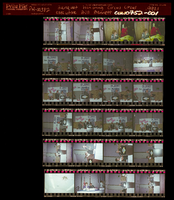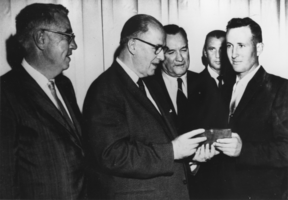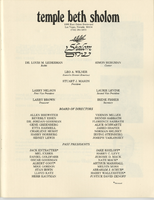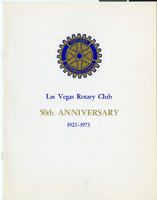Search the Special Collections and Archives Portal
Search Results

Photographs of banquet honoring Circus Circus executive Bill Bennett, culinary supporter during Frontier Strike, Culinary Union, Las Vegas (Nev.), 1990s (folder 1 of 1)
Date
Archival Collection
Description
Arrangement note: Series III. Internal: Work
Image

Pahrump Valley rancher Tim Hafen receives the Outstanding Young Farmer Award: photographic print
Date
Archival Collection
Description
From the Nye County, Nevada Photograph Collection (PH-00221) -- Series IV. Pahrump, Nevada -- Subseries IV.F. Hafen Family. The award was presented by the Junior Chamber of Commerce for Governor Charles Russell. U.S. Secretary of Agriculture, Ezra Taft Benson, presented the award. U.S. Senator Molly Malone stands in the background with Beldon Katleman, owner of the El Rancho, at the El Rancho Hotel, Nevada.
Image
Las Vegas PRIDE Parade Records
Identifier
Abstract
The Las Vegas PRIDE Parade Records (2016-2017) contain administrative files that document how the Southern Nevada Association of PRIDE, Inc. (SNAPI) organized the 2016 and 2017 PRIDE parades in Las Vegas, Nevada. Materials include correspondence with event organizers, parade participant information, and PRIDE event guides.
Archival Collection
Janis Walker oral history interview
Identifier
Abstract
Oral history interview with Janis Walker conducted by Claytee D. White on July 03, 2006 for the Boyer Early Las Vegas Oral History Project. In this interview, Walker discusses her career as an African American showgirl in Las Vegas, Nevada during the 1970s and 1980s. Walker describes dancing in the MGM Grand Hotel and Casino productions of
Archival Collection
Loreta Monson oral history interview
Identifier
Abstract
Oral history interview with Loreta Monson conducted by Jon J. Howard on March 01, 1979 for the Ralph Roske Oral History Project on Early Las Vegas. In this interview, Monson discusses moving to Las Vegas, Nevada from Utah for her husband's job. Monson also discusses the growth of Las Vegas over the years. She talks specifically about hotels and casinos. Finally, Monson briefly describes her family life.
Archival Collection
Johnny Eshow Haig Papers
Identifier
Abstract
The Johnny Eshow Haig Papers (1970-1990) are comprised of contracts, agreements, and correspondence of musician Johnny Haig, who worked as a trombone player and conductor at various hotels in Las Vegas, Nevada from 1955 until 2000. Additionally, the papers house extensive original music scores written by Haig. The papers primarily cover Haig’s later career in the 1970s and 1980s.
Archival Collection
Summa Corporation records, 1946 to 1989, 1970 to 1978
Level of Description
Scope and Contents
The Summa Corporation records (1946-1989) include administrative, film-related, legal, and financial records primarily pertaining to the management of Howard Hughes' various corporations and assets. Administrative records contain correspondence and agreements to create The Amazing Howard Hughes documentary, research into Hughes' corporate history, and correspondence describing the management of Hughes' corporations. Film-related records include research into the copyrights of Hughes' films, contracts, agreements, and correspondence regarding film distribution and reel inventories. Legal materials relate to film piracy research and Hughes' legal battles with the Classic Film Museum.
Archival Collection
Collection Name: Howard Hughes Film Production Records
Box/Folder: N/A
Archival Component

Program from event commemorating retirement of Leo Wilner as Executive Director of Temple Beth Sholom, 1984
Date
Archival Collection
Description
Program booklet for the testimonial dinner held for Leo Wilner's retirement includes dedications from colleagues and friends.
Text

Las Vegas Rotary Club 50th Anniversary Program, 1973
Date
Archival Collection
Description
Text

Transcript of interview with Thomas Rodriguez by Maribel Estrada Calderón, September 10, 2018
Date
Archival Collection
Description
Known for “raising hell and making a difference” in the Las Vegas Valley, Thomas Rodriguez has dedicated more than four decades of his life to the political, educational, and social advancement of the Latinx community. Tom was born in 1940 to Jennie Gomez and Joseph Rodriguez in a Topeka, Kansas neighborhood its residents called The Bottoms. Mexicans, Mexican Americans, American Indians, African Americans, among other peoples lived in this diverse and beloved community. In 1956, the Urban Renewal Program, a program funded by the Federal Government that sought to raze neighborhoods the city considered to be “slums,” forced The Bottoms’ residents to abandon their homes. Rodriguez recalled the effects that this event had on his family and on his educational career. Despite his family’s relocation, he graduated from a high school located in a nearby neighborhood in 1958. Years later, the activism and ideology of the Chicano Movement of the 1960s taught Rodriguez that to overcome the injus
Text
